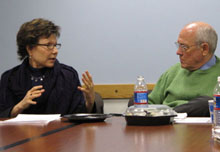
February 16, 2010 — Deborah Amos, Goldsmith Fellow at the Shorenstein Center and foreign correspondent for NPR, recounted the recent political history of Iraq at a Shorenstein Center Speaker Series event titled “Sectarianism and a Post-Election Iraq.”
Amos decided to be a “stay-behind reporter and continue looking at Iraq” after much U.S. attention turned to Afghanistan. As the March elections approach, Amos observes that “sectarianism has emerged again as the major issue — the Sunni/Shia divide — in this campaign.”
Looking back on the provincial elections in January 2009, Amos explained that the Iraqis, tired of the Sunni/Shia violence, began to lean away from sectarianism toward a more secular nationalism. Prime Minister al-Maliki was “rebranding himself as a nationalist,” and the election was seen “as a way to show how stable Iraq had become and that the country was headed in the right direction.”
“But that was before the ruthless bombing campaign that began in August,” Amos said. The image of a stable Iraq was upended, and Maliki’s reputation as the “strong man who could keep Baghdad safe” was undermined. So when the nationalist lists were released for the upcoming 2010 elections, Shiite candidate Ahmed Chalabi used the opportunity to blacklist 500 candidates, most of whom were Sunnis. The Sunnis felt “targeted” and began to leave Iraq. Analysts have said that “it was a move worthy of Karl Rove because it was both brilliant and cynical at the same time.”
Now there is an unprecedented number of Iraqi refugees, most of them Sunnis, in Syria, Lebanon, Egypt and Jordan, Amos said, who no longer “see a place for themselves in Iraq.” But in Iraqi culture, leaving is typically a “last resort” and so the refugee situation is “telling the story of country that is shedding its diversity” as Shiites and Sunnis separate, and is forming a “crack in the social system of Iraq.”
Amos concluded that there is a “complete reversal of where the country was just a year ago, and it shows how weak the political culture is.”
This article was written by and the photos taken by Janell Sims of the Shorenstein Center.

